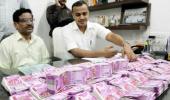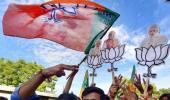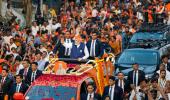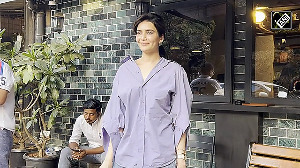Candidates in Punjab's Jalandhar can spend Rs 15 for a cup of tea and the same price for a samosa they offer to people during public meetings and campaign trails in the Lok Sabha elections.

However, those in Madhya Pradesh's Mandla can spend Rs 7 for a cup of tea and another Rs 7.50 for a piece of samosa, considered a staple snack in many parts of the country.
With polls to elect the 18th Lok Sabha approaching, district poll panels are fixing the rates for expenses as part of the election expenditure monitoring process.
The candidates will have to manage their expenditures within the prescribed limit. These rate cards often become a subject of "meme-fest" on social media about the prices not being in sync with the current inflation level.
In most states, including Andhra Pradesh, the expenditure ceiling for a Lok Sabha candidate is set at Rs 95 lakh.
However, in Arunachal Pradesh, Goa and Sikkim, the limit is slightly lower at Rs 75 lakh per candidate.
Similarly, for Union Territories, the expenditure ceiling ranges from Rs 75 lakh to Rs 95 lakh per candidate, depending on the region.
In Jalandhar, chole bhature has been capped at Rs 40 while mutton and chicken have been priced at Rs 250 and 500 per kg respectively.
Desserts like dhodha (Rs 450 per kg) and ghee pinni (Rs 300 per kg) are also on the menu besides lassi and nimbu pani priced at Rs 20 and 15 per glass respectively.
The cost of tea is low at Rs 5 in the rate card of Balaghat in Madhya Pradesh but the samosa is priced higher at Rs 10.
The Balaghat rate card also has idli, sambhar vada and poha-jalebi priced at Rs 20 while the cost for dosa and upma has been fixed at Rs 30.
In Thoubal district of violence-hit Manipur, tea, samosa, kachori, khajur (dates) and gaja (dessert) have been priced at Rs 10 each.
Candidates in the northeastern state's Tengnoupal district, will have to stick to Rs 5 for black tea and Rs 10 for milk tea.
The list has a wider spread of non-vegetarian items with duck and pork priced at Rs 300 and Rs 400 per kg respectively.
Chicken (broiler) and fish like rohu, mrigal and sareng, are also on the list.
In Chennai, the price of tea has been raised from Rs 10 to Rs 15 and coffee from Rs 15 to Rs 20, while the rate of chicken biryani has been reduced from Rs 180 to Rs 150 per packet as compared to 2019.
In the expenditure card for Gautam Buddha Nagar (Noida/Greater Noida), vegetarian thali comes for Rs 100, a samosa or a cup of tea for Rs 10, kachori for Rs 15, a sandwich for Rs 25, and a kilogram of jalebi for Rs 90 per kg.
North Goa candidates can have batata vada on menu at a cost of Rs 15, same as that for a samosa. The tea has been capped at Rs 15 while coffee can cost Rs 20.
The rate card for Haryana's Jind offers the candidates to hire a tandoor for Rs 300 and features delicacies like dal makhni and mix veg for Rs 130 while matar paneer is priced at 160.
Breads like butter nan, missi roti and plain roti are also on the platter besides desserts including kaju katli and gulab jamun.
While parties and candidates often offer workers and voters liquor, none of the rate cards mention alcohol.
Other heads which find mention in the rate cards range from expensive infrastructure, such as helipads, luxury vehicles, and farmhouses, to miscellaneous items like flowers, cooler, tower ACs and sofa.
The rate cards have also prescribed the ceiling on rates for hiring of different vehicles for campaigning right from a Tata Safari or Scorpio to a Honda City or Ciaz or a bus to ferry the public to rally grounds.
Rates have also been set for rose garlands, marigold garlands and bouquet by some poll panels while some have included heads like party merchandise including caps and flags.
The rate cards also have an list of permissible rates for hiring venues and accommodation. The expenditure includes the spend for public meetings, rallies, advertisements, hoardings, pamphlets, flexis, campaign material and all other election-related work.
At present, there is a ceiling on campaigning funds for individual candidates in the electoral fray but no cap on the money political parties can spend for electioneering.
According to the revised guidelines issued by the ECI, the maximum permissible expenditure for campaigning in a Lok Sabha constituency varies across different states and Union territories.
Section 77 (1) of the Representation of the People Act, 1951 says candidates are expected to keep an account of expenditure incurred on the elections from the "date on which he has been nominated" till the "date of declaration of the result".
Polling for the 543 Lok Sabha seats will be held in seven phases, starting with 102 in the first phase on April 19. The votes will be counted on June 4.











 © 2025
© 2025